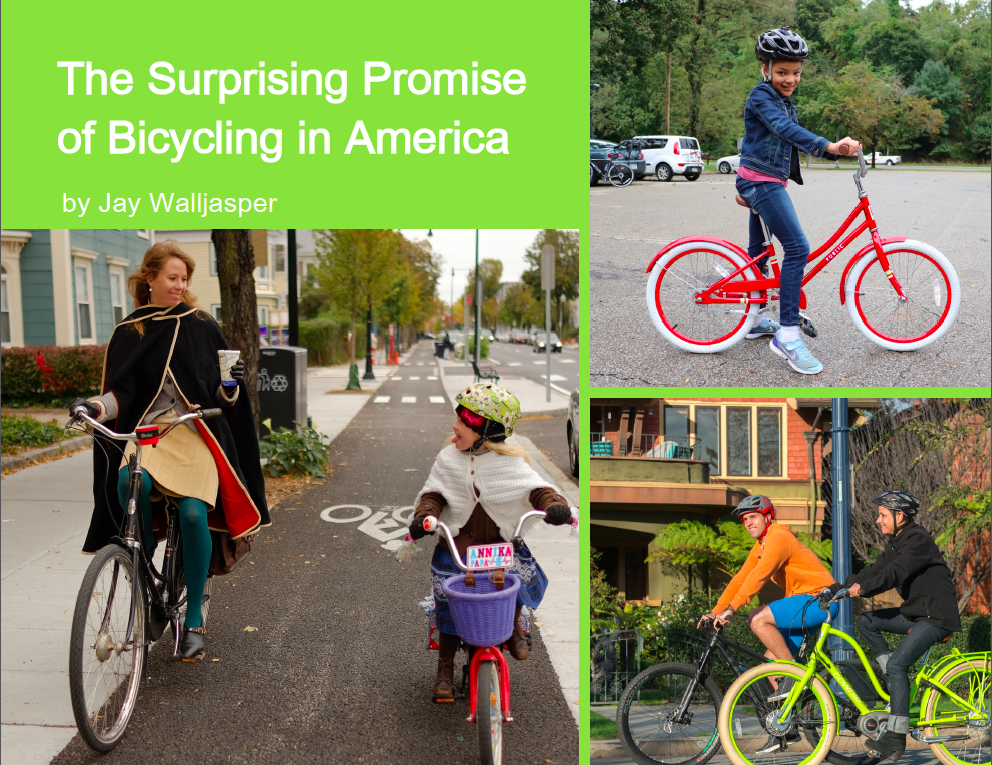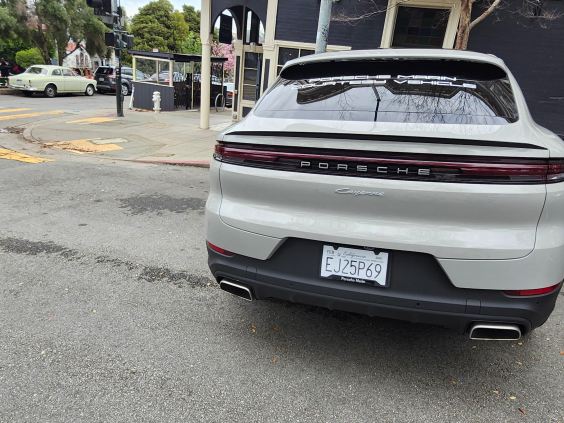A new report, The Surprising Promise of Bicycling by Jay Walljasper, tells the stories of people who have been pushing for better biking conditions in the U.S. for the last twenty or so years, and hints at why the gains made will not be going away any time soon.
The report's subtitle is “Twelve Reasons Biking Will Grow,” and lists among those reasons the rising awareness of health benefits from being active, the introduction of bike-share and electric bikes, which can expand the availability of bikes to riders who otherwise might be unable to ride, the widening influence of local grassroots groups working for their communities, and recognition that bikes are a key weapon in the fight against climate change.
“Our big goal” with the book, according to designer and editorial contributor Melissa Balmer of Pedal Love, “is that we want to get biking, walking, and transit into the bigger sustainability conversations.”
“We're not there yet. When policy makers talk about transportation planning [or solving problems like congestion and climate change], they talk about electric cars and driverless cars—but they don't talk as much about public transportation, or biking, or even e-bikes,” she said. “We want to raise the awareness of biking as a tool for optimism.”
This story focuses on funding. The creation of a pot of money for bike and pedestrian infrastructure projects in the federal transportation bill of 1991 for the first time made building trails and bike lanes a real possibility in communities throughout the country, although not many took advantage of it. That funding was under threat when the bill came up for reauthorization six years later—but in the meantime, the first Thunderhead Retreat had taken place. That seminal event brought together a group of people who wanted to create a better world for people on bikes, and who would go on to expand and grow bike advocacy in the ensuing years.
The first task of this budding advocacy group was to save the federal funding that was under attack, and its grassroots campaign—meeting with congressional representatives and newspaper editorial boards, among others—was so successful that the funding was not only preserved but expanded when the new transportation act, TEA-21, was passed.
The annual Thunderhead event brought together people like Andy Clarke, who at the time was working with Rails-to-Trails and later headed up the League of American Bicyclists, and Charlie Gandy, a former Texas legislator who became an outspoken advocate for better biking everywhere and helped bring protected bike lanes to Long Beach long before other cities had them. Other early advocates included Deb Hubsmith, who went on to found Safe Routes to Schools National Partnership and headed up the Marin Bicycle Coalition, and Dave Snyder, who co-founded both San Francisco's Critical Mass movement and the San Francisco Bicycle Coalition, and who now leads the California Bicycle Coalition.
Also included in the report are brief profiles of other biking advocates, including Monica Garrison, founder of Black Girls Do Bike in Pittsburgh, PA; Maria Contreras Tebutt, who founded the Bike Campaign in Woodland, California, where she teaches people of all ages and backgrounds to ride and fix bikes; and Cynthia Rose, who co-founded Santa Monica Spoke.
The authors are aware of gaps in their story, and hope to expand on some of them in the future. “We didn't go into the professional side of bike advocacy and planning that has mushroomed since that federal funding was passed,” said Balmer. There is also a story to be told about the bike industry, which has shifted over the years from catering almost exclusively to men on road bikes and now is creating and selling bikes suited for all kinds of uses, from hauling kids to climbing muddy trails to racing to moseying along with a basketful of groceries and flowers.
“We wanted to look at the future,” Balmer said when asked why they left out some of the older, uglier history of bike advocacy—for example, the ongoing legacy of John Forester's vehicular cycling movement that prevented innovative approaches now common in places like the Netherlands, but that the U.S. is only beginning to put in place.
“I just really wanted to bring forward ideas that would give other people a light at the end of the tunnel. Hopefully that era is over,” she added. “I'm not an advocate for people who already ride bikes; I'm an advocate for people who have never ridden a bike.”
“The Promise of Bicycling” can be downloaded for free as a PDF, but Walljasper and Balmer hope to raise enough money to expand it and publish it as a book in time for Bike Month next May. They will be launching a crowdsourcing campaign next week; details can be found at Pedal Love.






